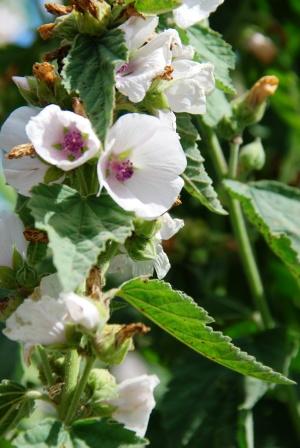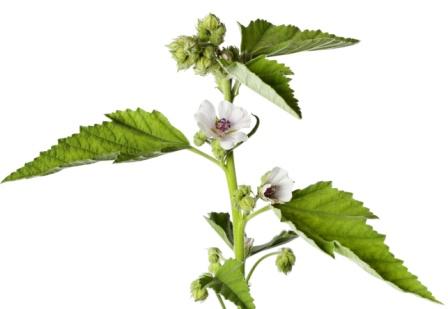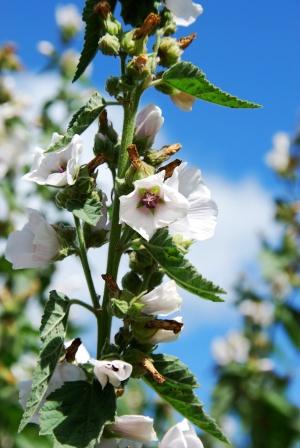Marshmallow – Althaea officinalis Uses, Research, Side Effects

Marshmallow is known as Khatmi in Ayurveda. It is a recently included herb into Ayurvedic Pharmacopoeia. It reduces high cholesterol, blood sugar levels and is a very good immuno-modulatory herb. Botanical name – Althaea officinalis Linn
Family – Malvaceae (Karpasa kula)
Table of Contents
Vernacular names
Names in different languages:
Hindi name- Gulkhairo
English name- Hallyhock, Marsh Mallow

Chemical composition
Althaea officinalis chemical composition:
Root-L-aeabinan
Seed-b- sitosterol,stigmosterol, scopoletin etc
(Reference: Illustrated Dravyaguna Vijnana, Vol. II, by Dr JLN Shastry)

Medicinal Properties
Guna (qualities) – Snigdha – unctuous, oily, Picchila – slimy, Guru – Heaviness
Rasa (taste) – Madhura – sweet
Vipaka- Madhura – Undergoes sweet taste conversion after digestion
Veerya – Sheeta – Coolant
Effect on Tridosha – Balances Vata and Pitta.
Part used, dosage
Part used- Root, seed, leaves
Dosage- Powder 3-6 g in divided dose per day.
Sanskrit verse

Uses
Marshmallow uses:
Its leaf paste made with water is applied externally to relieve swelling with pain.
Mutrala – acts as diuretic
Indicated in
Pratishyaya – running nose,
Kasa – cough, cold, asthma
Mutrakruchra – dysuria
Root powder is administered to improve breast milk secretion.
It is useful as a blood thinning agent, it lowers cholesterol levels, blood sugar levels and is useful in gastritis and peptic ulcers.
It also possesses antimicrobial, anti inflammatory, free radical scavenging and immunomodulatory effects..
Side effects
Seek medical advice for usage during pregnancy and lactation.
It can be used in children in small doses.
Interaction with medicines, supplements
Can this be used while taking Homeopathic medicine?
Yes. This product does not react with homeopathic medicine.
Can this medicine be continued while taking supplements like multivitamin tablets, Omega 3 fatty acids etc?
Yes. Generally, this product goes well with most dietary supplements. However, if you are taking more than one product per day, please consult your doctor for an opinion.
With western
medicines
Seek your
doctor’s advice if you are taking this product along with other western
(allopathic / modern) medicines. Some Ayurvedic herbs can interact with modern
medicine.
If both Ayurvedic and allopathic medicines are advised together, then it is
best to take Allopathic medicine first, wait for 30 minutes and then take the
Ayurvedic medicine.
Sthanika karma (Systemic Acton)
Externally – Anti inflammatory and Analgesic in nature. Leaf and seed paste is applied on Mastitis, Inflammatory wounds, Pain in the flanks, Pleurisy etc. Root decoction can be given for gargling in throat infection.
Internally
Digestive system – Facilitate normal movement of doshas. Root decoction is indicated for oral administration and for Enema in digestive tract infections, Dysentery, intestinal obstruction etc.
Respiratory System – PAcifies kapha dosha, indicated in Rhinitis, Cough due to vata pitta dosha vitiation
Excretory system – Indicated in Dysuria ands in burning micturition









